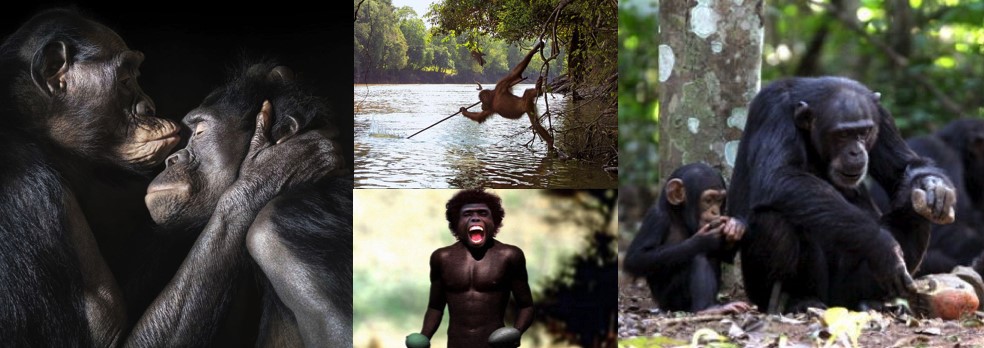Human Cognitive Evolution (ANTH 495D)
Human minds seem unlike those of any other animal. But what is it that makes human cognition unique? How and why did these traits evolve? This seminar will explore these questions by evaluating several leading hypotheses regarding human cognitive uniqueness. The first part of the course will explore which aspects of human cognition are shared with other animals, and which may be uniquely derived in our lineage. For example, are humans the only animals capable of teaching, cumulative culture, language, or mental time travel? The second part of the course will explore evolutionary scenarios that may be responsible for the evolution of uniquely human cognition. For example, what roles did cooperative breeding, living at high population densities, or exploiting novel environments play in the evolution of our species’ psychology?
Animal Minds (ANTH 170C2)
Human cognition is unusual, but are we the only thinking beings? Do other animals experience and reason about the world in similar ways? What does it mean if they do or don’t? This course explores the nature of animal minds, similarities and differences with human cognition, and how and why cognition evolves. We will explore what animals understand about their physical and social worlds, including topics such as whether animals have emotions, concepts, an understanding of others’ psychology, foresight and memory, logical thought, or an understanding of self. The course will cover historical perspectives on animal minds, as well as the latest research on these exciting topics.
Dog Thought (Course number TBD)

Dogs were once written off as a boring domesticated species with little to contribute to the scientific study of behavior, cognition, or human evolution. However, research in the past two decades has led to a resurgence of interest in dogs across scientific disciplines, especially those focusing on behavioral and cognitive evolution. In this course, we will explore the scientific literature addressing how dogs understand their world, how dog psychology evolved during domestication, and what these processes may tell us about the evolution of other species, including our own.
R programming for data analysis and visualization (ANTH 696D)
This course provides an introduction to the R programming language for data analysis and visualization. R is a free and open source software environment that is widely used for both data analysis and graphical techniques. The course will include three main units covering (1) an introduction to R as a programming language (2) using R for data visualization, and (3) using R for statistical analyses. The unit on statistical analysis will focus largely on implementation, and conceptual understanding of statistical tests, rather than the underlying mathematics. Therefore, a previous formal statistics course covering probability theory, hypothesis testing, and common statistical procedures is a recommended (but not required) prerequisite. Course content includes short online interactive tutorials from DataCamp.com, supported by the DataCamp for the Classroom Initiative.
| ANTH170C2 |




